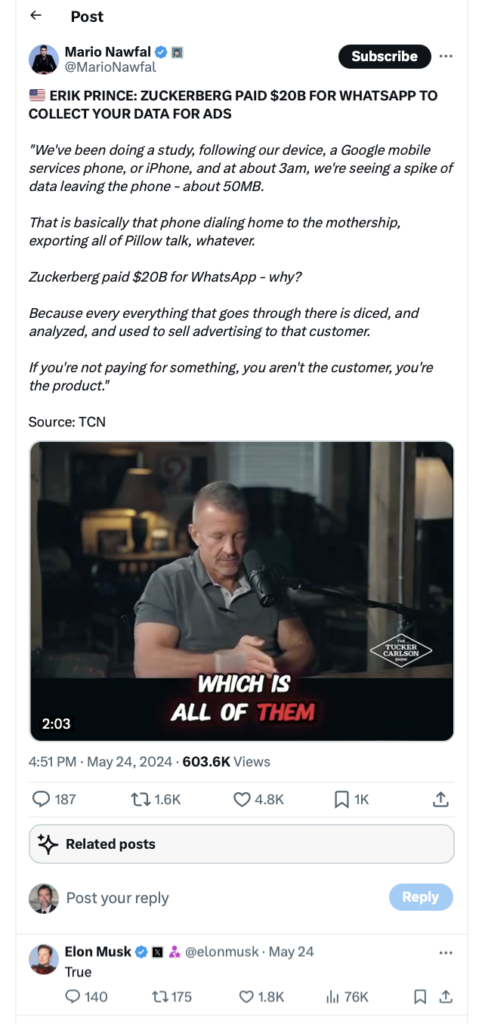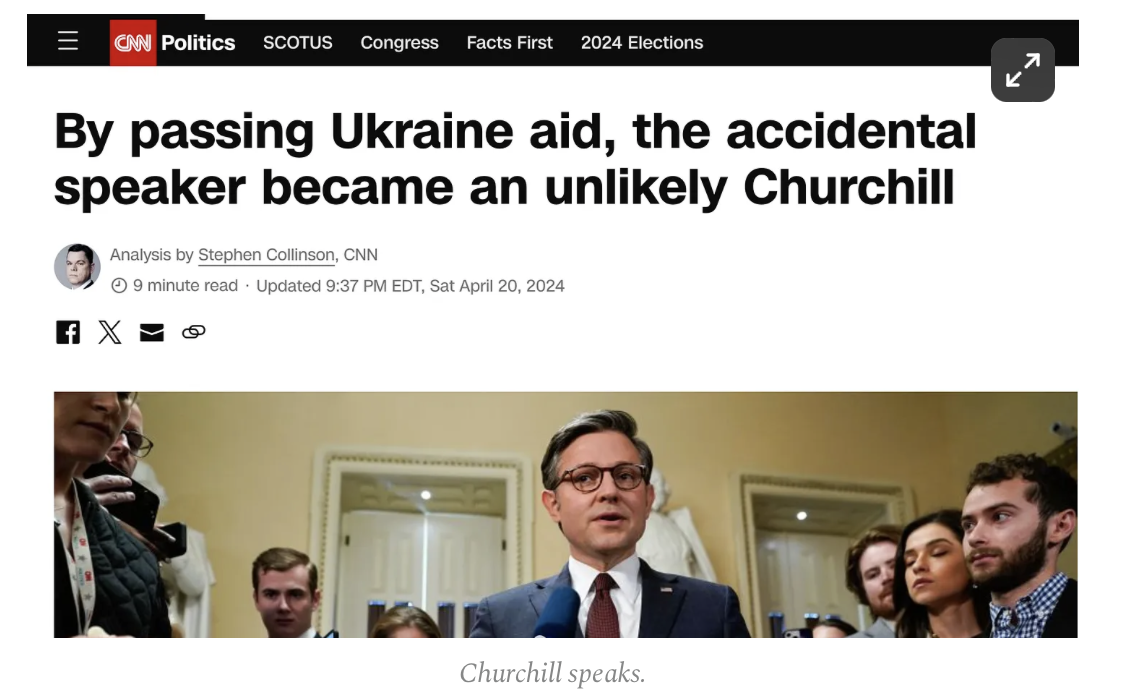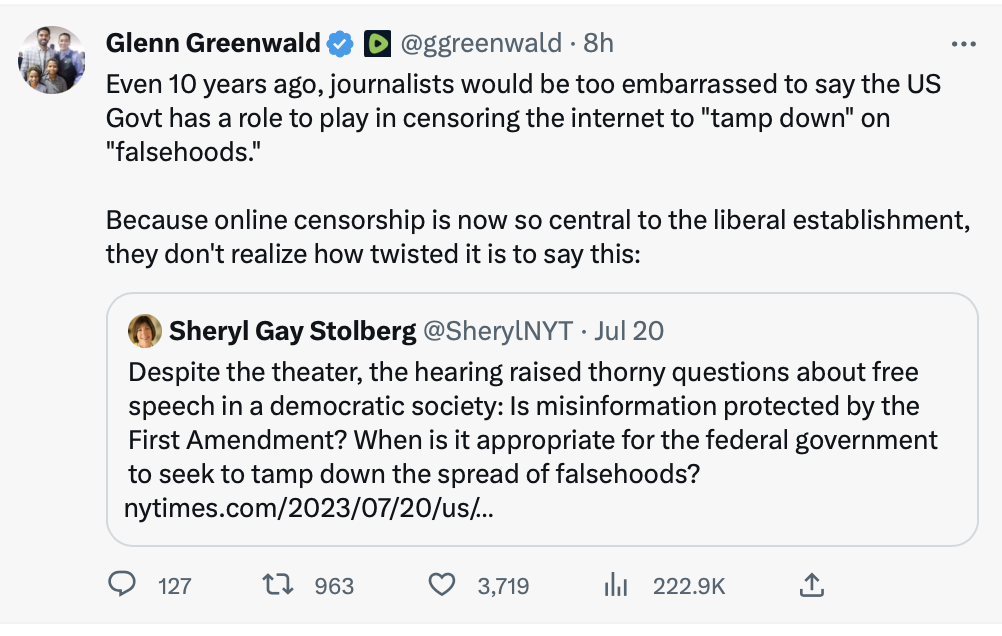Ten years ago, it was easy to find liberals who opposed war, authoritarian tactics and censorship. Good luck finding "liberals" who take those positions now, case in point being the authoritarian tactics most liberals strongly supported during COVID. The positions of most liberals have dramatically shifted, in lockstep with the positions of the DNC. One result is that I am politically homeless. I am pessimistic that the United States will ever figure itself out, that it will ever again treasure free speech.
Two months ago, an active tenured law professor recently told me that the First Amendment was a good idea at the time and the Founders were well-intentioned, but we now need to allow government control of misinformation and disinformation. He trusts the FBI and the CIA to tell us what is true.
What?? What's going on? I've been struggling to figure things out. So has Matt Taibbi.
It wasn’t hard to understand why the FBI was organizing a censorship scheme, or why companies like Twitter and Facebook that lived off lucrative regulatory subsidies were going along with one. The motives of the powerful actors in all this were never mysterious. The part that didn’t compute was why so many in the general public were accepting of the situation. This included people I knew. Many people in America are not just accepting of digital censorship, they believe it to be vitally necessary.
Learned Hand . . . wrote in 1944, “Liberty lies in the hearts of men and women; when it dies there, no constitution, no law, no court can even do much to help it.” Justice Hand had a hard time defining this thing that “lies in the hearts of men and women.” But, as an American, I believe I experienced it growing up. As [Former President of the ACLU], Nadine [Strossen] said, it’s that “right not to remain silent,” something in which I believed almost religiously. It was something fiery and motivational, which I felt gave me an advantage over people from other parts of the world ...
[I]f that spirit of liberty Justice Hand talked about dies, no amount of lawsuits or congressional hearings will revive it. In their book [The Canceling of the American Mind], [Greg] Lukianoff and [Rikki] Schlott suggest that just as a person’s natural instinct is to slouch, society’s natural instinct is to censor. Is that true?
If so, that would make the last few hundred years of our history, a history of defiant political movements, astounding scientific invention, and vast outpourings of great music, art, literature, movies, even standup comedy — it would all be an aberration. But why? ...
I spent months thinking about this. It troubled me from the beginning of the Twitter Files story. Now, I believe Americans are not just being censored. I believe there’s an equivalent effort on the front end of Internet culture to rob people of their will to be free. I believe this is is the hardest part of the Internet censorship story to understand, but also the most crucial and most dangerous...
As we found in the Twitter Files, we lean more and more on machines to do our thinking for us. However, the worst part is, we often do not distinguish between thinking that is ours, and thinking that is someone else’s.
We Americans once cherished independence, and lived off folk tales about going off on one’s own, on the open road. Think about Ishmael, or Huck and Jim, or Chuck Berry, who picked up a guitar and sang about setting out with “no particular place to go,” creating a dazzling sound that touched a nerve with the whole world.
That was then. Now instead of giving the world something invigorating and freeing like rock n’ roll, we’re exporting mass neurosis. At home we’ve become afraid to walk even a few steps without our electronic helpers. Our sense of self is now inextricably tied to a huge global entourage of prying commentators who live in those phones of ours that are always in our pockets and whose good opinion we never stop seeking, whether we admit it or not.
This was never us before. We long celebrated the individual, even if the individual was crazy...
The freethinker was always a cherished archetype.
But thinking for yourself is hard work, and political interests in the Internet age have preyed on another very American instinct: laziness. Their sophisticated programs begin with the premise that the Internet always punishes difference and rewards conformity. This is the core principle at work in shadow-banning and de-amplification algorithms. These automated surveillance tools look for phrases like “Open-minded” or “I like to do my own research” or “I’m generally apolitical” and don’t score the people saying such things as tolerant, creative freethinkers.
What the algorithm instead detects is someone harboring a dangerous willingness to embrace unorthodox ideas, or look at a forbidden thing and not flee.
It was once a virtue for Americans to say, when asked about their politics, “None of your damn business.”
Nobody thinks that way anymore, either. Young people especially are worried to the point of mental illness about their likes and ratios. We not only want people to know what we think, we’re terrified of people not knowing what we think, lest we be suspected of harboring something unsavory underneath.
This is how it is for Americans trying to be themselves now. First they became addicted to the Internet as a tool of convenience. Then it became a cheap substitute for real-life interaction. Finally they learned to submit to the wisdom of crowds, which on the Internet, as we also found out, is really an artificial representation of a crowd, generated by political and social engineers from the FBI, DHS, the Pentagon, Meta, Google, and other bureaucracies. These groups are letting loose algorithms on that “Spirit of liberty” Justice Hand talked about. The results have not been good.
If they can preemptively extinguish that fire in us, formal censorship will become unnecessary. The population will become too fearful of difference to ever risk punishment in the first place...




